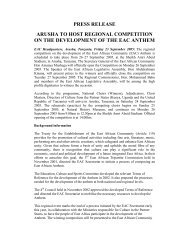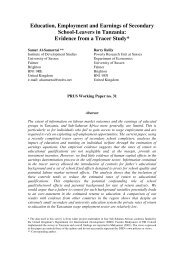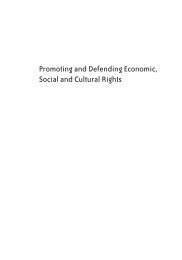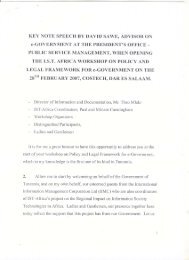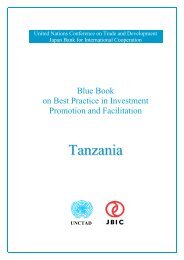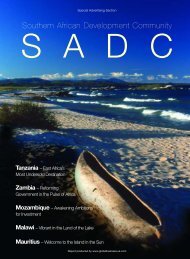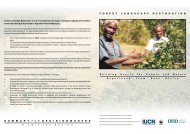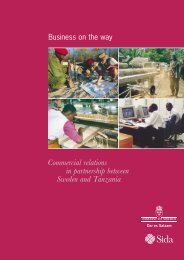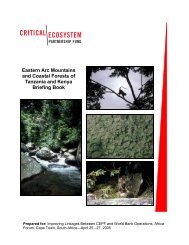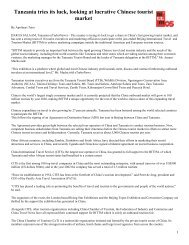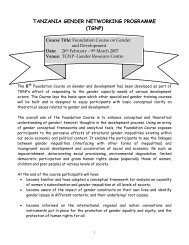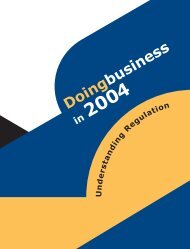September 2005 - Tanzania Development Gateway
September 2005 - Tanzania Development Gateway
September 2005 - Tanzania Development Gateway
Create successful ePaper yourself
Turn your PDF publications into a flip-book with our unique Google optimized e-Paper software.
ASPO Ireland<br />
www.peakoil.ie/newsletters<br />
597. New books<br />
Six new books on the peak oil issue have appeared.<br />
1. The End of Fossil Energy and the Last Chance for Sustainability by John. G. Howe (ISBN 0-<br />
9743404-0-5, from www.mcintirepublishing.com) is an excellent, succinct work, written by an engineer,<br />
who both explains the problem and offers practical solutions.<br />
2. Oil Crisis by C.J.Campbell (ISBN 0906522-39-0 from Multi-Science Publishing Co, 5, Wates Way,<br />
Brentwood, Essex CM15 9TB, UK. www.mscience@globalnet.co.uk) is a 397 page account covering, in a<br />
semi-autobiographical style, the nature and history of oil business, and the geological constraints to<br />
production. It describes the First Half of the Age of Oil before addressing the Second Half, which now<br />
dawns. The great tensions of the transition to a new world of reduced energy supply are evaluated, touching<br />
at times on sensitive political reactions. It ends on a hopeful note that the survivors will enjoy more benign<br />
lives in better harmony with themselves, each other and the environment in which Nature has ordained them<br />
to live. The book includes a number of interviews with other oilmen and analysts. Oil statistics and graphs,<br />
by country, region and the world as a whole, endeavour to correct grossly unreliable public data (see Item<br />
598). An extensive bibliography is included.<br />
3. The Collapsing Bubble: Growth and Fossil Energy by Lindsey Grant (ISBN 1-931643-58-X, Seven<br />
Locks Press, California) opens with a nice quotation: Anyone who believes exponential growth can go on for<br />
ever in a finite world is either a madman or an economist – Kenneth Boulding (Economist). Its chapter<br />
headings summarise its contents: 1. The New American Century? 2. How Long the Twilight? 3. Twilight or<br />
Dawn? It concentrates on the responses to Peak Oil, particularly from a US perspective, linking the Iraq<br />
invasion with US demand for oil to maintain increasingly illusive economic growth. It expresses particular<br />
concerns about the environment and the level of sustainable population.<br />
4. Petrodollar Warfare: Oil, Iraq and the Future of the Dollar: by William R.Clark (ISBN 0-86571-<br />
514-9, New Society) exposes international subterfuge and the manipulation of public opinion to explain the<br />
hidden workings of government before addressing the title subject in a convincing and penetrating manner.<br />
5. The New Pearl Harbor by David Ray Griffin (Second Edition ISBN 1-84437-036-4) provides a useful<br />
background on the pretext for the War on Terror, whose oil agenda is covered in some of the other<br />
referenced works.<br />
6. Energy Beyond Oil by Paul Mobbs (ISBN 1-905237-00-6) addresses particularly the reaction to Peak<br />
Oil, examining how societies will have to react and prepare, pointing out that Noah started building the Ark<br />
long before the waters rose.<br />
It is noteworthy that Books 2 and 4 commend the Rimini Protocol, which is in a sense an ASPO initiative,<br />
now being publicized on ASPO websites including www.peakoil.ie as a practical mechanism by which<br />
governments and others could react and plan to meet the evolving situation.<br />
598. International Energy Agency: <strong>2005</strong> Outlook<br />
The International Energy Agency’s latest report is well up to the past standards expected from this<br />
organization. The report includes in Table 4 a listing of World Resources 1995-2025. Reserves are<br />
reproduced from the Oil & Gas Journal (which with a broad definition of Conventional includes for example<br />
178.8 Gb for Canada compared with World Oil’s report of 5.0 Gb). “Reserve Growth” and “Undiscovered”<br />
estimates are taken from the USGS Mean values, discredited as they are by the actual results of the first tenyears<br />
of the study-period. The report has however managed to notice that oil prices are more than double that<br />
forecast in the organisation’s last study, but this is seen as little cause for concern as they are shown in Fig 11<br />
to fall again and still be below current levels in 2025.<br />
The OECD Governments, who fund the organization, will be well pleased with the new study, which<br />
spares them responsibility for having to address the consequences of the actual unfolding supply situation.<br />
Nature for her part does not lie.<br />
ASPO Newsletter 57, <strong>September</strong> <strong>2005</strong> page 7 of 12



